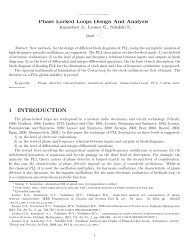Technical Sessions – Monday July 11
Technical Sessions – Monday July 11
Technical Sessions – Monday July 11
Create successful ePaper yourself
Turn your PDF publications into a flip-book with our unique Google optimized e-Paper software.
TD-04 IFORS 20<strong>11</strong> - Melbourne<br />
2 - A Multi-objective Genetic Algorithm to Determine Accrue<br />
Provision Rates Achieving Smooth and Low Inventory<br />
Write-downs with Real Settings in a Semiconductor<br />
Memory Maker<br />
Jei-Zheng Wu, Business Administration, Soochow University, 56<br />
Kueiyang St., Sec. 1„ 100, Taipei, Taiwan, jzwu@scu.edu.tw<br />
Most of semiconductor memory manufacturers have suffered from high inventory<br />
write-downs and subsequent negative impacts on stock market performance.<br />
This study aims to develop a multi-objective genetic algorithm to determine<br />
accrue provision rates that can generate a set of nondominated solutions<br />
of low inventory write-downs and low write-downs variation. A case study was<br />
conducted for validation. The proposed algorithm can help top managers compare<br />
and determine a number of write-down strategies by an interactive process<br />
to extract their preferences over write-downs levels and stability.<br />
3 - Two-Warehouse Supply Chain Model with Power-form<br />
Stock Dependent Demand<br />
Chaman Singh, Mathematics, Acharya Narendra Dev College,<br />
(University of Delhi), Chaman Singh, Dept. of Mathematics„<br />
Acharya Narendra Dev College, (Unviersity of Delhi),<br />
Govindpuri, KalkaJi, <strong>11</strong>0019, New Delhi, Delhi, India,<br />
chamansingh07@gmail.com, Shivraj Singh<br />
In realistic world, there usually exist various factors that induce the retailer to<br />
order more items than the capacity of his Own-warehouse (OW). Therefore,<br />
for the retailer, it is very practical to determine whether or not to rent other<br />
warehouse and what order policy to adopt if other warehouse is indeed needed.<br />
For the stock dependent demand pattern, retailer has his own warehouse to display<br />
the items and may hire another warehouse of the larger capacity, treated as<br />
rented warehouse (RW) to storage the excess inventory. In this paper, a supply<br />
chain model with power form stock-dependent demand rate is developed. The<br />
demand rate is assumed to be a polynomial form of current inventory level in<br />
Own-warehouse. It is considered that the deterioration rate per unit items in<br />
the RW and OW are different due to different preservation environments as a<br />
consequence the holding costs per unit item in RW and OW are also different.<br />
Proposed model is illustrated with some numerical example along with some<br />
sensitivity analysis of parameters.<br />
� TD-04<br />
Tuesday, 17:00-18:30<br />
Meeting Room 103<br />
Revenue Management 1<br />
Stream: Revenue Management and Dynamic Pricing<br />
Invited session<br />
Chair: Joern Meissner, Kuehne Logistics University, Hamburg,<br />
Germany, joe@meiss.com<br />
1 - The Use of Design of Experiment in Strategic Decision<br />
Making<br />
Emre Alptekin, Industrial Engineering Dept., Galatasaray<br />
University, Turkey, ealptekin@gsu.edu.tr, Gülfem Isiklar<br />
Alptekin<br />
In todays’ the economic world, the capacity and the existence of the companies<br />
become directly related to their market value. It is essential that the company<br />
or the organization addresses to its current and prospective customers; and the<br />
best way of carrying out this is marketing. As marketing become more and<br />
more important, a need for making strategic decisions in this field emerged. In<br />
this work, we have analyzed which factors influence the market share value of<br />
a globally known soft drink company.<br />
2 - Challenges in Air Cargo Revenue Management<br />
Joern Meissner, Kuehne Logistics University, Hamburg,<br />
Germany, joe@meiss.com, Kevin Glazebrook, Emily Cookson<br />
The Air Cargo industry faces some unique challenges: Highly volatile demand,<br />
weight/volume uncertainty even for pre-booked allotments and very<br />
short booking cycles are some of the features. We propose a new dynamic<br />
programming formulation that an air cargo company can use to maximize its<br />
expected profit. Our formulation differs from previous ones in that capacity<br />
and demand uncertainty is incorporated into the model using probability distributions.<br />
We present first numerical results from an industry project with the<br />
cargo division of a major airline.<br />
60<br />
3 - Risk Minimizing Strategies for RM Problems with Target<br />
Values<br />
Joern Meissner, Kuehne Logistics University, Hamburg,<br />
Germany, joe@meiss.com, Matthias Koenig<br />
We consider a risk-averse decision maker in the setting of a single-leg dynamic<br />
revenue management problem with revenue controlled by limiting capacity for<br />
a fixed set of prices. Instead of focussing on maximizing the expected revenue,<br />
the decision maker has the objective of minimizing the risk of failing to<br />
achieve a given target revenue. Interpreting the problem in the framework of<br />
finite Markov decision processes, we augment the state space and change the<br />
objective to the probability of failing a specified target revenue. We present a<br />
numerical study and discuss advantages and limitations.<br />
� TD-05<br />
Tuesday, 17:00-18:30<br />
Meeting Room 104<br />
Marketing/Operations IV<br />
Stream: OR and Marketing<br />
Invited session<br />
Chair: Wei Shi Lim, NUS Business School, 12345, Singapore,<br />
Singapore, weishi@nus.edu.sg<br />
1 - Optimal Dynamic Pricing Strategies in the Presence<br />
of Speculators and Forward Looking Consumers: Are<br />
Speculators Friends or Foes?<br />
Wei Shi Lim, NUS Business School, 12345, Singapore,<br />
Singapore, weishi@nus.edu.sg, Christopher Tang<br />
In a market with speculators whose sole objective is to arbitrage on the anticipated<br />
price differential to make a profit, we identify conditions under which<br />
the firm should deliberately price lower in Period 1 by selling to speculators so<br />
as to increase the number of arrivals in Period 2 in a downward market. We<br />
fruther show that speculators can help the firm to "price into the future’ in a<br />
rising market if increased sales in Period 1 can boost the potential demand in<br />
Period 2. Finally, we examine whether a third-party should and could deter<br />
speculators’ entry by imposing an entry barrier.<br />
2 - Information Provision and Price Competition in a<br />
Duopoly Setting<br />
Chung-Chi Hsieh, Department of Industrial and Information<br />
Management, National Cheng Kung University, 1, University<br />
Road, 701, Tainan, Taiwan, jcchsieh@mail.ncku.edu.tw, Wei Shi<br />
Lim<br />
This paper studies the retailers’ information provision and pricing strategies in<br />
a duopoly setting in the presence of heterogeneous consumers. By characterizing<br />
heterogeneity of consumers in terms of information possessed and loyalty,<br />
we develop an approximate yet analytical model of the retailers’ equilibrium<br />
decisions. We then analyze how consumer heterogeneity and search cost shape<br />
the retailers’ equilibrium decisions and profits.<br />
3 - Optimal Pricing and Inventory Strategies With Stochastic<br />
Demands and The Option of Overselling<br />
Wee Meng Yeo, Singapore Institute of Manufacturing<br />
Technology, 71 Nanyang Drive, 638075, Singapore,<br />
yeowm3@singnet.com.sg, Wei Shi Lim<br />
We examine a two-period model in a duopoly where each seller may also adopt<br />
the overselling strategy, where goods sold earlier may be resold to late consumers<br />
as long as an appropriate compensation is provided to the early consumers.<br />
This work extends the majority of overbooking literature that do not<br />
consider price discrimination, much less pricing strategies. We provide exact<br />
conditions under which overselling and conventional selling are equilibrium<br />
selling strategies.<br />
4 - Optimal Pricing of Customized Products<br />
Brigitte Werners, Management and Economics, Ruhr-University<br />
Bochum, Universitätsstr, 44780, Bochum, Germany, or@rub.de,<br />
Niels Becker




